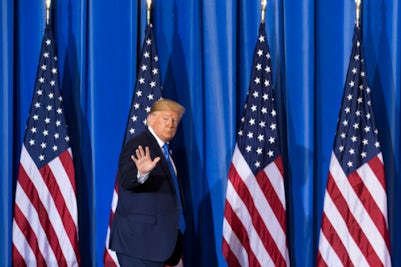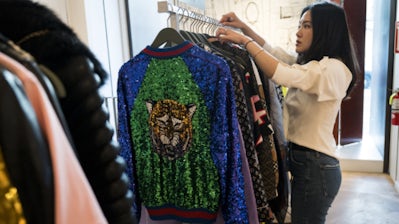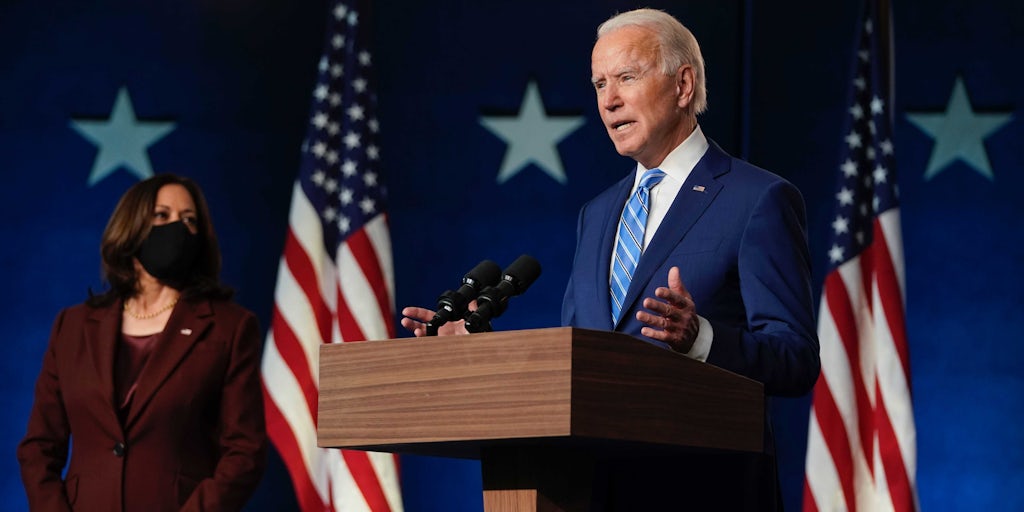Biden Just Won a Narrow Victory. Is Washington Gridlock Good for Fashion? | BoF Professional, The Week Ahead
THE CHEAT SHEET
At Last, Some Closure in US Politics

President Donald Trump was defeated in the Nov. 3 election | Source: Tomohiro Ohsumi/Getty Images
- Joe Biden was declared the victor in the US presidential election on Saturday
- Two runoff elections in Georgia in January will determine control of the US Senate
- Fashion and retail stocks have soared this week
It took a few days longer than expected, but come January 20, Joe Biden will be president. Before the election, the fashion industry had mixed feelings about the former vice president, who promised to be a more-stable steward of the world’s largest economy than President Donald Trump, but was also inclined toward tax hikes and costly environmental and labour regulations. On balance, most executives would probably accept much of Biden’s platform in exchange for competent management of the pandemic and an end to the surprise tariffs and TikTok bans that came to define the Trump administration.
Brands will almost certainly welcome an end to the Trump administration’s endless provocations on race, sexuality and other issues; over the last four years, they were often put in the awkward position of speaking out on behalf of their young, diverse customers while risking retaliation by Republicans in Washington. In a deeply divided country, the culture wars are certainly not over, but brands may play a different role with Biden in charge.
The surge in US stocks as the results trickled in last week point to a different calculus, however. Investors are clearly betting on a divided Washington, with Democrats controlling the presidency and US House, and Republicans the Senate (Democrats can still win a trifecta by taking two Georgia seats in a runoff on January 5). The GOP would almost certainly block any major Biden initiatives, leaving many aspects of the business-friendly status quo in place. Less clear is whether Republicans would also block future stimulus packages that might become necessary if the pandemic carries over deep into 2021. Biden can also use executive orders and other tactics to go around an obstinate legislature. For example, he has already said he will reenter the Paris Climate Agreement soon after taking office.
The Bottom Line: Many struggling retailers have more immediate concerns, namely the upcoming holiday shopping season. A resolution to the election will help by potentially boosting consumer confidence.
The Resale Market Is Getting Real Crowded

Inside The RealReal store in San Francisco in March | Source: Getty
- The RealReal reports third-quarter results on Nov. 7
- The luxury resale platform has struggled to stock enough inventory during the pandemic, but demand is strong
- Poshmark and ThredUp, two rival resale sites, are planning IPOs
It’s a busy time in the resale category. After some initial logistics and inventory snafus, the pandemic has proved to be a boon for secondhand sales, with consumers eager to rethink their closets and score deals in a tough economy. The RealReal is benefitting from these trends, but so are its many rivals. Indeed, every corner of the fashion world, from sneakers to watches to couture, has a crowd of online secondhand marketplaces and consignment sites, with new entrants joining the fray regularly.
The RealReal is among the biggest and, as the first in the current wave of start-ups to go public, among the best-capitalised. It is one of the few resale sites with physical stores, including a Chicago flagship that opened in October, and has formed partnerships with some big luxury brands. But it’s never turned a profit, and has struggled with warehouse closures and the strict lockdown in New York, a major market for the site. With Poshmark and ThredUp, two resale giants that specialise in less-pricey finds, planning IPOs, the real competition to rule this multi-billion-dollar market is just beginning.
The Bottom Line: Farfetch’s string of successes this year, culminating in last week’s joint venture with Alibaba and Richemont, shows how a start-up can come to dominate the online luxury space without ever turning a profit. Can The RealReal do the same in the fast-growing resale market?
China’s Luxury E-Commerce Juggernaut

Alibaba’s Singles Day is on Nov. 11 | Source: Courtesy
- Last week, Alibaba and Richemont invested $1.1 billion in Farfetch for a new joint venture in China
- Farfetch, which already has relationships with JD.com and Tencent in China, reports third-quarter results on Nov. 12, with a big jump in sales expected
- Singles Day, Alibaba’s annual shopping holiday on Nov. 11, generated 268.4 billion yuan ($38.4 billion) in sales for the online retailer last year
China’s rebound from Covid-19 lockdowns earlier this year has stunned many observers, particularly those in the US and Europe where the economy remains in the doldrums. Singles Day, the world’s biggest shopping holiday by a wide margin, will provide another data point for Chinese consumer confidence. For luxury brands, 11.11 is a chance to make up for lost sales in the West.
Farfetch China, the new joint venture between the online luxury marketplace, Alibaba and Swiss conglomerate Richemont, is too new to be a factor this week. But the impact of the tie-up on Chinese e-commerce, and global luxury, will be immense. There is now one clear channel for Western luxury brands to reach Chinese consumers online. And the fact that both Richemont and rival Kering, via the Pinault family’s investment unit, are backing Farfetch is noteworthy.
The Bottom Line: This tie-up likely signals the beginning of a long-awaited consolidation in luxury e-commerce. Farfetch has few rivals that can match its scale (one, Yoox Net-a-Porter, happens to be owned by Richemont). The wildcard is Amazon, which recently launched a luxury platform of its own.
SUNDAY READING
Professional Exclusives You May Have Missed:
The Week Ahead wants to hear from you! Send tips, suggestions, complaints and compliments to [email protected].
Was this BoF Professional email forwarded to you? Join BoF Professional to get access to the exclusive insight and analysis that keeps you ahead of the competition. Subscribe to BoF Professional here.

